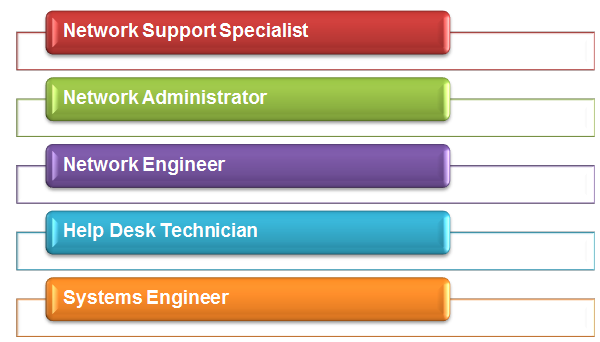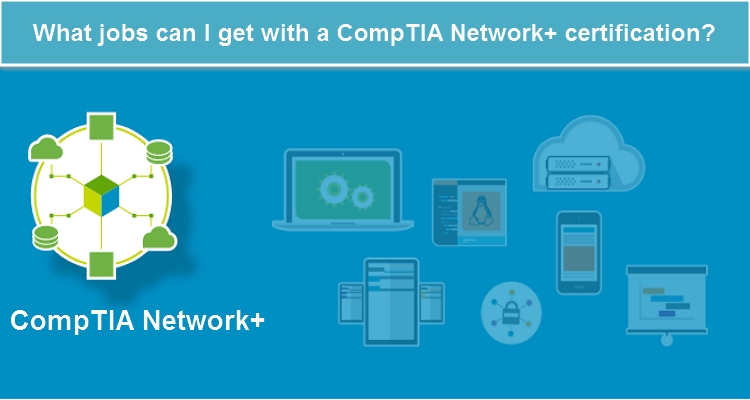CompTIA Network+ certification is a beginner-level certification that confirms your fundamental skills and understanding needed for a job in IT networking. It involves subjects like network structure, security, operations, and problem-solving. This certification is impartial to specific brands, showing you can work with various hardware and software. It’s meant to prove your networking expertise and boost your IT career.
In this article, we will learn about the job roles and other details related to the exam.
CompTIA Network+ Certification Job Roles
If you’re considering pursuing a CompTIA Network+ certification, you may be wondering what types of jobs you can expect to be qualified for. Here are some potential job titles and roles that you may be eligible for with a CompTIA Network+ certification:
- Network Support Technician: This is a key role in most IT departments that involves providing technical support to end-users, troubleshooting network issues, and performing basic network maintenance.
- Become Network Administrator: In this job, you’ll be responsible for taking care of and looking after network systems like routers, switches, and firewalls. You’ll also put in place security measures to prevent cyberattacks.
- Network Engineer: Network engineers design and implement complex network solutions, often for large organizations. This can include designing new networks, upgrading existing ones, and ensuring that all components of the network work together seamlessly.
- Cybersecurity Analyst: With a strong foundation in networking, those with a CompTIA Network+ certification may be well-suited for a role as a cybersecurity analyst. In this role, you’ll monitor networks for potential security breaches, analyze security threats, and implement security measures to protect against attacks.
- IT Consultant: As an IT consultant, you’ll provide advice and guidance to organizations on how to improve their IT infrastructure and maximize their network performance. This can include everything from designing new networks to implementing new security measures.
- Wireless Network Engineer: Wireless networks are becoming increasingly common in both residential and commercial settings. Having a CompTIA Network+ certification means you’ll be equipped to create, set up, and handle wireless networks effectively.
These are just a few of the potential job titles and roles that you may be eligible for with a CompTIA Network+ certification. Other possible job titles include network technician, network analyst, and network operations center (NOC) technician.
CompTIA N10-007 Exam Course Structure
The CompTIA Network+ (N10-007) exam objectives cover the following topics:
- Networking Concepts
- Infrastructure
- Network Operations
- Networking Security
- Network Troubleshooting and Tools
Prepare for the exam using the CompTIA Network+ (N10-007) Study Guide!
Now, let’s talk about the top job roles that you can get through CompTIA Network+ certification.
CompTIA Network+: Top Job Roles
CompTIA Network+ covers the specific skill that prepares IT, professionals. Further, this results in getting a good job in the networking field by providing job training. Also, this certification will provide a deep understanding of computer networking. And, it will ensure that the IT professionals have all the skills needed to function in the role that includes:

1. Network Support Specialist
Network support specialists are experts who look into computer network issues, figure out what’s wrong, and find solutions. They also take care of the organization’s networks, ensuring they are safe and protected. Their responsibilities include various tasks such as:
- Firstly, they back up the network data and configure security settings to ensure that only the right people can get in.
- Next, they utilize tools to run tests that identify security problems and report them. Additionally, they investigate the network to locate issues with connecting to other systems.
- Network support specialists also keep track of network support activities. In addition, specialists configure wide area network (WAN) or local area network (LAN) routers and related equipment.
- Lastly, they provide end-user support and also evaluate network performance data.
Eligibility Requirement
- For this role, it is required to have an associate’s degree or a bachelor’s degree in a technical field.
- Furthermore, network support specialist jobs necessitate CompTIA A+, CompTIA Network+, CompTIA Linux+, and CompTIA Server+ certifications in systems. Also, these credentials might assist in validating the required competencies for the position.

2. Network Administrator
A network administrator supports the company’s internal servers. The tasks are done in the following ways:
- Firstly, installing and maintaining the network and hardware systems
- Secondly, diagnosing and repairing connectivity issues.
- Moreover, monitoring the network to maintain speed and availability.
- Lastly, managing backup systems for the network.
Eligibility Requirement
- Most of the network administrators have an undergrad or graduate degree in filed like computer science, network administration, and systems engineering. However, for entry-level networking positions, a degree is not required. But, for higher positions, a degree, as well as certifications is required.
- Moreover, getting CompTIA Network+ certified will increase your skills to become a network administrator.

3. Network Engineer
Network engineers or network architects build and design communication networks that include local area networks, wide area networks, and intranets. Moreover, a network engineer is responsible for performing a task that includes,
- Firstly, designing, deploying, managing and troubleshooting the networks.
- Secondly, analyzing network traffic and predicting growth to determine future requirements.
- Moreover, explaining how to meet the needs of the organization with understanding the concepts of cybersecurity.
- Lastly, following the latest technologies for determining the best options for the organization.
Eligibility Requirement
- To pursue this career, numerous network engineers hold a bachelor’s and even a master’s degree in computer-related fields.
- Additionally, having hands-on experience in IT systems or network management along with CompTIA Network+ certification is necessary.

4. Help Desk Technician
Being a help desk technician demands both solid technical knowledge and effective communication skills. Furthermore, this role involves handling various responsibilities. Some of them are,
- Firstly, diagnosing and solving computer issues.
- Secondly, installing and training the end users for new technologies.
- Moreover, providing remote technical support over the phone or the internet.
- Lastly, maintaining operating systems requires repairing hardware and configuring software.
Eligibility Requirement
For this role, it is required to have CompTIA certification. And, it is also recommended to have IT skills that will help in proving that you have the required ability to handle the job. When it comes to employing help desk professionals, CompTIA A+ certifications are commonly acknowledged.

5. Systems Engineer
A systems engineer’s job is divided into various sections of the business model. That is, it must collaborate with computer science, engineering, mathematics, and analytics to develop a solution that meets the needs of the business.
However, some responsibilities of a systems engineer are,
- To begin, communicate with the team to understand the system’s exact requirements, which include design, installation, and hardware, as well as software components.
- Secondly, specifications for design, installation, and other system-related information must be documented.
- Additionally, providing advice on project budgets, design concepts, and development assistance, including system problems.
- Then, evaluating current and emerging technologies to consider the implementation of upgrades for security portability, compatibility, and usability.
- Lastly, monitoring systems to detect and prevent potential problems. And, providing guidelines for the implementation of secure systems using design compatibility of system components.
Eligibility Requirement
- To become a Systems Engineer, having a bachelor’s degree in a technical field like computer science is necessary. Higher positions might need a master’s degree.
- Furthermore, besides their degree, they need years of experience in fields like information security, systems engineering, and system architecture integration.
- Certifications like CompTIA Network+ can also help validate the needed skills for this role.

Top Companies
Companies that hire CompTIA Network+ professionals includes,

Ways to prepare for the CompTIA Network+
CompTIA Network+ exam can be challenging for those who do not have knowledge or experience in their concepts. But to resolve this issue, there various training providers that can help you in providing the best material for CompTIA Network+ Certification exam. Below there are some training options that can be helpful for this exam.
1. Instructor-led Training
CompTIA teams up with various organizations offering classroom training for its certifications. These classes cover study materials and online learning, all aligned with the latest exam goals. Specifically, for CompTIA Network+ (N10-007) training, the costs for in-person classes vary from $2,000 to $4,000 based on the course length.
2. Practice Tests
Aspirants having good knowledge and experience in networking often skip the practicing part. And, this is very important to assess yourself using the CompTIA Network+ (N10-007) practice test. Since the N10-007 exam is new hence, the sources for practice tests are limited but you can find some training providers online. Click here to get the free practice test for the CompTIA Network+ exam.
3. Self-Study
Self-study is a great way to evaluate and understand the CompTIA Network+ knowledge. In the same vein, CompTIA makes its exam objectives available with a detailed outline. Use the below domains to create CompTIA Network+ (N10-007) study notes and start a good preparation.
- Firstly, Networking concepts
- Secondly, Infrastructure
- After that, Network operations
- Network security
- Lastly, Network troubleshooting and tools.
Exam Glossary
Here are some key terms that may appear in the CompTIA Network+ certification exam:
- OSI Model: The Open Systems Interconnection (OSI) model is a way of explaining how communication works in computers and networks. It helps standardize how different devices talk to each other, regardless of the technology they use inside.
- TCP/IP: Transmission Control Protocol/Internet Protocol, often shortened to TCP/IP, is like the language that computers on the internet use to talk to each other.
- LAN: A Local Area Network is a group of connected computers within a small area like a home, school, or office.
- WLAN: A Wireless Local Area Network is a wireless version of a local network that connects devices without using cables.
- Switch: A switch is like a traffic director for computers in a network, making sure data goes to the right place.
- Router: A router connects different networks and helps data find the best way to its destination.
- Subnetting: Subnetting divides a big network into smaller parts to make it work better and be more secure.
- IPv4/IPv6: These are like the addresses computers use to find each other on the internet.
- Topology: Network topology is like the layout of a network – how everything is connected.
- Troubleshooting: Troubleshooting is finding and fixing problems in a network so it runs smoothly.
- Network performance optimization: This is about making sure a network runs as fast and well as possible.
- Network monitoring: Network monitoring is like keeping an eye on a network to catch any issues.
- Wireless security: Wireless security is like making sure no one can sneak into your Wi-Fi without permission.
- Network management: Network management is like taking care of a network, making sure everything works right.
Expert’s Corner
In conclusion, CompTIA Network+ certification is a great way to enhance your career. That is to say, CompTIA Network+ prepares a candidate by providing specific skills and capabilities for networking. And, CompTIA Network+ is a gift for IT professionals as it gives the required knowledge to solve complex networking issues. Moreover, it will help you in getting the job you aimed for. Most importantly, CompTIA Network+ has gained the trust of many organizations globally. So, crack the exam and make yourself a pro in the field of networking.
Learn and enhance your CompTIA Network+ skills. Become a Certified CompTIA Network+ Professional Now!

